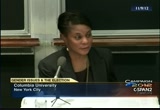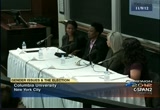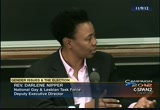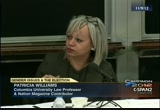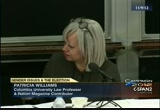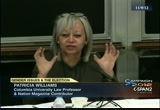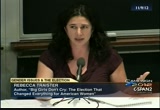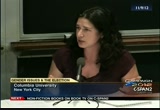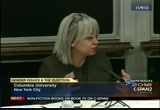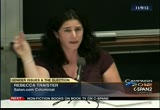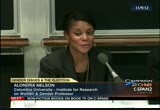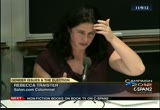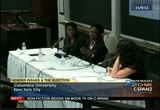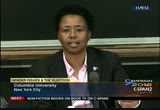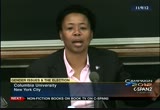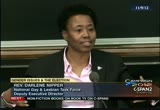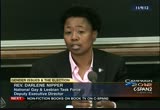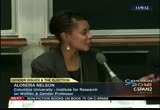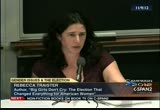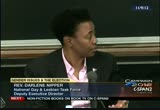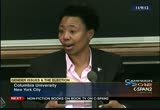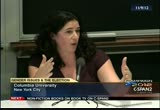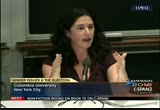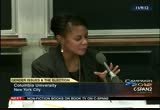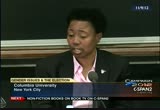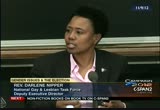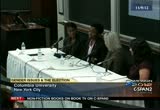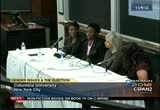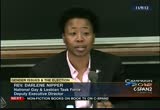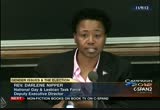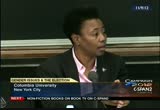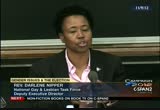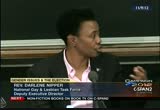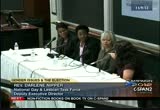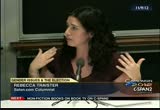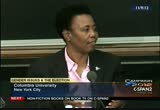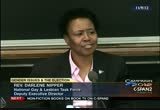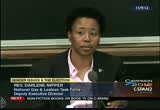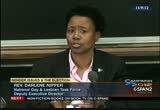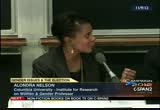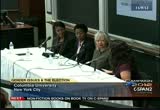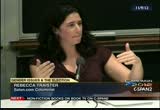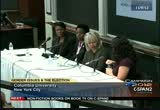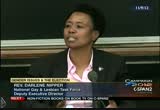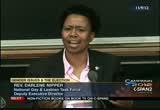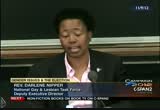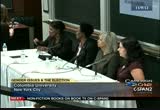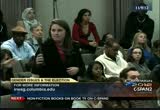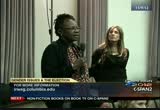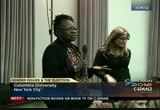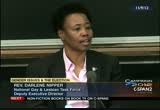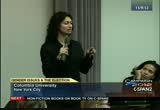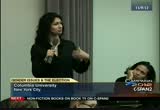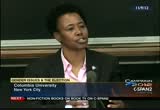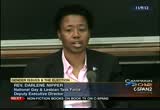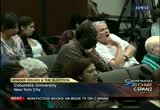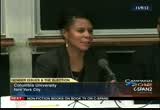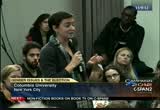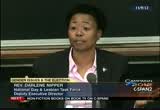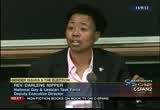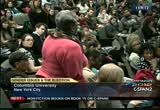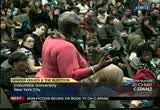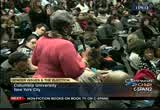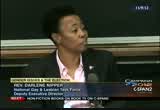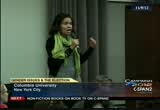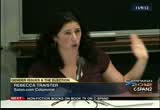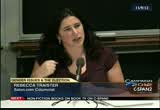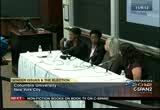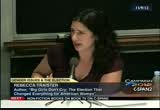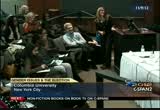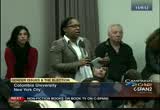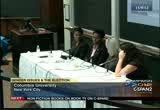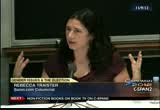tv Today in Washington CSPAN November 22, 2012 6:00am-8:00am EST
6:00 am
everything that we hold dear. a win for obama, she was writing this on tuesday, will mean a continuation and they were saying of the cultural and legislative trends we have witnessed in the last few years. i'm curious to hear what you think about that. [inaudible] politics trump gender and sexual orientation. darlene's response was actually more proactive and away. it has also been put in conversation with what we think this has to do with the election
6:01 am
and gender and sexual politics are kind of in this larger context. >> i think it does. one of the things that is interesting about the president, coming out the freedom to marry or what seemed like the vice president accidentally coming out in a way. [laughter] but what's really to your point, while these things are very important and i think that they have a clear role in places like maryland where the marriage referendums on the ballot. the timing was the backlash about what i care about. and that happened early to get the, you know, what is going to happen when my one-man or support of lgt whites come out,
6:02 am
how will this impact the election? there was an early test and we got a chance to get those issues out of the way so that they were not the things we were talking about. >> it was almost as though the last election was one in which barack obama and his very embodiment challenged about blacks and every time he referred to the single mother, they would blink and say oh, it's not a black single mother, to white single mother. and every time they talk about a father, it was a delayed response to some after they didn't know quite where to fit in. ultimately,, at the same time,
6:03 am
there was a longer conversation with wes warriors what needs to be single mother who is not black and so i think there was a real wine. i was afraid there would be a backlash and all of us were feeling. they were putting forth the same effort they put forward for years. the prejudices and they never really re-examine what it would mean to reconsider those tropes in those slightly shifted things. and so when you had todd akin,
6:04 am
we'll really have to think a lot about, is that religious religion, or is it really deep and historical sense of oneness? my own little theory is that it became until recently, people like strom thurmond, the fact that so many white men, historically in this country pulled themselves that they were not the product of race and so this invisibility of the product of race is not the product of the women who must've really wanted them. otherwise it is -- it is very
6:05 am
clear that some parts operate at a distance. >> i would also, speaking to your question about whether this is about action or reaction, and of course, i think it is all part of this so that everything is constant in action and reaction -- one thing i want to point to, i think when we talk about these kind of race comments on the contraceptive comments are so outrageous over the past year, we think of it as a republican blood of stupidity. in fact, one of the interesting things is that it was prompted by unusual behavior on the part of the democrats. the democrats, while being the party of women, and about the time -- as soon as they started counting the gender gap, which really wasn't until 1980, they got labeled the mommy party. so for all of there being a
6:06 am
party of women, they have kept silent on the issue of women's rights. and they have not uttered words like abortion very often. something happened, and i think it was in this particularly small cycle. it was a susan g. koman decision on planned parenthood -- outside of the presidential cycle. there is such a strong backlash that was visible to everybody that there is such a tremendous backlash on the side of planned parenthood and reproductive health. and also freedom. that something clicked. i'm not saying that's the only reason, but democrats are speaking very differently on these issues. people talking about abortion --
6:07 am
people were talking about a run amok. i had not seen that at a democratic convention in years and years. in part it was democrats coming on strong on these issues that prompted it. it was because within the debate context and the media context, it was prompted rights. democrats are being called to explain their views. that is what forced a lot of the comments that felt this incredible flood coming in. you know, this was crazy on rape and contraception in matters of science. it was brought on by democratic action. ..
6:08 am
they went viral. there were these wonderful names that popped up all over the country. >> this is one of the things and you should look it up because they are hilarious. on the pages of the republican senators who wanted to defend planned parenthood or who are making outrageous statements, people started they caught the sarcasm bombings these
6:09 am
legislatures. so your people on the public facebook was over at kerry or whoever saying, i need an appointment. since you estimate that willie's house, at this stage. and people were so funny and creative and that helped. it's the spirit and technology of the internet. >> and i suppose everybody saw this going on amazon.com and look at every binders in the thousands and thousands of comments. this finder just doesn't hope my comments. >> priority for standardized effect is. there are no women in it. >> was speaking associate media, one of the questions is prompted by treat from election evening. when we realize we had part of the historic results of this last week where he had 20 women
6:10 am
in the u.s. senate, and historic number and rebecca rightly reminded us that it was in part because of things like emily's list that i want to have a conversation about the kind of institutions and the organizations that have been working quiet they all this time to make this moment possible. i don't have to say something about emily's list. >> families list within washington politics, it is an incredibly powerful force. at some point they were the largest organization. i don't know if that's still true, in the day of the super pacs, they are not the largest anybody. so emily's list is an organization that supports democratic pro-choice women for
6:11 am
all kinds of offices around the country. they are very powerful and have been working really hard for a long time to get more women effect did. other celebration about the creator of the woman, sometimes you want to say this is terrific progress in other times you say wow, 20%. but it's very, very hard work getting women elected. so i cited emily's list because they're the biggest. but there's grass-roots organizations, places like the white house project to go around trading at women, which is one of the biggest problems in terms of electing women. you know, organizations like sam bennett wins that campaign for him. all kinds of organizations support getting women into politics. >> and the same thing is true
6:12 am
for. we have the victory fun working for a long time. our key tap that is simple in some ways we used to say that knowing someone is enough to the folks, but then we learned something and this is a big issue for this election that we can see the value in the spirit we learned you have to do more than just know someone who is. you actually have to have a conversation. and this is scary for some of us, right? and then they learn not only did have a conversation, but shifted a conversation about who you are and who you love. so you have to have a conversation -- you have to get to the point of saying to someone, you know, what do you think about this? let me tell you about my -- you don't have to be queer or a
6:13 am
person who is lgbt, but having a conversation about why this matters in how this is like any other family and why it's about a common humanity. we had persuasion campaigns going on for years and years. anyone know with them losing the plot. we are peeked down, right? but this has finally come to the point where we could actually stand up for campaigns at the same time, but not because they cycle one. we were working in maine in 2000. we have 1.7 million conversations of people in maine just a cycle. so this is about having deep conversations about who we are and who we love and being a person of the people around us so people can say okay, right, you're actually having the same issues they have. we both have problems with garbage pickup.
6:14 am
i think we should stand with you. either way, will you support marriage equality? i'll help you with that garbage. [laughter] a lot of spent on the ground. obviously the lgbt task force is one of them, but many others could be said of freedom to marry and solely focused on that issue. then organizations like slb and the work solely on "don't ask, don't tell." it's been a lot of groundwork, but i do think the online outlets are important. i thought they were so brilliant and just miraculous -- how quickly they organize around women's issues and important of us not allowing some of the commentary around abortion rights center of personhood in particular. i thought they got messages to
6:15 am
all kinds of people. what they did was have the list of people working with from the move on days and the old list and pull those less forward, including folks on emily's list to make a current sort of vibrant communication, where everybody could get the message that it's not okay. i agree with you, rebecca it wasn't about voting. it's not okay for you to make this kind of commentary about our lives at this time. he didn't have to be during the election, so i thought that was great. >> a mention of emily's list made me remember it sounded and. and just last year, anita hill published a book about the disproportionate effect of the housing crisis on women and that makes me think there's something else going on in the last four years, which is the feminization
6:16 am
of poverty and the tremendous impact this debt crisis, particularly subprime mortgages is disproportionate when men come away when an minority women and i think is the kind of invisible force as well as the ballot casting choice. >> the reality of this lgbt been completely lost in that picture. a lot of times people talk about single mothers and in fact, these are people who have families and partners. people don't recognize that. it's why they think it is so important that the administration agencies have working to change regulatory policy and not just focusing on legislation because things like how you define family in agencies like how that are critically important to women who have issues with passing and
6:17 am
women who face even greater discrimination. >> i love this point about you having been working since 2000. there was a way in which some of us so underestimated but was possible in this moment that on election night it felt like magic. i want to raise the institutional question to underscore that people have been working really hard for years and decades to do this. so one of the great successes that they mentioned at the last week was that we now have 20 women in the senate and lots more women of color in the house of representatives, the way very few women of color in the senate. very few black women were elected in this election cycle although there are games where asian-americans in the tenets and so i wondered if any of you -- i don't know which you might have to say about that, but what do we think about an
6:18 am
organization that begins in the wake of the anita hill controversy and the dancer produces to see if it's a factor are not producing black women intellectual politics in a particular sort way. >> first of all, i should announce myself as a member of the proper demographic. so the gender gap as far as voting goes his huge this year. it is thicker than in 2008 after many predictions of his going to narrow. however, white women voted for mitt romney. when you broke down and women devoted other race, it is just sending. unmarried women made up 22% of the electorate.
6:19 am
but they voted 70% to 30% democratic. one of color, latina women, black women that this is how barack obama won the presidency in races were decided. white women were not on that side of the vote. i would say that what i hear often, and this comes to issues of getting more women to run and more women of color to run is everybody will tell you it's a pipeline problem. if there's too many bylines from women or women of color in the media, everybody says women never pitch. and so that's something you hear. for me, one of the stars of this political event was nina turner and ohio. as you'll see in television doing incredible work on voter suppression staff in ohio.
6:20 am
she was not up for election, but she was a star and is everybody talks about the other person that the person was nailed for, a republican black woman who just barely lost to elect for a moment like she was going to win her house seat. this is a problem within the feminist movement and has been always. the question of moving forward, but not just for one kind or a couple of kinds of women. these are issues that are very much in play in our activism. >> i think also, black women face the intersection of prejudices. on the one hand, there's too
6:21 am
much criticized for being aggressive because of the stereotype of black men will consign him. it's certainly true that black women when they been expressive in the senate coming in now, who was it that couldn't get him, she had dreadlocks, maxine waters. they kept asking her for idea and arrested her because they didn't recognize here. she was mocked endlessly for her assertiveness basically. the same thing that elizabeth warren faced in scott brown, which was to sneer at her as an elite professor, which really got to me. it means we started teaching about the same time.
6:22 am
for women of color and the entire united states teaching the, two blacks, one nation, one latina. and that is not so long ago. a few years afterwards i went into the classroom and having mostly men in a classroom, most of whom on election night before the election was decided i had to turn us in a classroom and was filled with that romney's. i woke up to a brand-new world. this is the way law schools looked when i was coming out. when you first started teaching to the woman, when he lived in massachusetts he didn't just say professor, he said blake though you could really profess
6:23 am
anything. i really rocketed me back. so i think in addition to the mockery generally and the electorate, in addition to the demeaning of women generally, you sort of have a celebrated when were hired, but it's also a double whammy in a political setting. >> i'm in washington. it's an interesting place. i love d.c., but when you look at the washington that we are talking about, when you actually go into the halls of congress and have a visual, the next time you look at something going on mtv that is showing one of the halls, just take a look at it. it will look different from this room. it's almost like a reverse of
6:24 am
what we have heard about were the demographics of this country are going. so i just wonder how attached we are just thinking about what happened in the election this time. it's almost like read a sense, but what is actually occurring in terms of the change in the nation. when it comes to said seven people, we have the unique position in opportunity because we cut across all these demographics. the issues of race and class and inability to actually have any real conversations. i do think it's very difficult for people in positions of power in terms of legislators to take a look. if you don't have do until this moment, what's really changed? when the electorate actually really does seem to be changing
6:25 am
in terms of the demographics, then why would you do history we have? why would you do anything different? now we are at the point where this election, was to learn more about what happened will be a turning point for us to determine whether or not our electorate has changed enough, the democrats have changed enough that people are voting enough that we really need to make significant changes in the next opportunity for us to do with that issue is going to the midterm elections. not 2016, the midterm elections. >> the other thing that's going to be happening in coming elections and the reason why it matters is the 17 to 20 women. by sir paley mattered, why barack obama matters. but we are in the process of doing is expanding our idea of a leadership could look like if this is crucial to the question of how we view and why there are
6:26 am
more women of color, were men of color. we have to imagine what a candidate could look like. so if there is a young white man in college and graduate school and is particularly smart and inspiring and excited and committed to doing good public work, batman will be sold you should run for office. if there is an equivalently inspiring, exciting, smart women of any color, it is much more common to say wow, you'd be great in politics. you should manage the campaign. that is one of the reasons it matters as soon as we begin to see that young women when that young men of color leadership, that is part of why it matters barack obama is our president. a generation of children for
6:27 am
thinking of president looking that way. people who grow up in states with women governors, you know, tulsi gabbard who's going to be sworn in in hawaii. she was just elected the other night. then it makes a much more likely at the earliest asian people are going to enter a list of public politics for the people around them to say hey, you should run, which is that crucial thing to get people at the beginning so they can amass the power to get the big jobs in the most powerful parts of their lives. >> and let's not leave out tammy baldwin. the person happens to be. >> i was just about to raise the question about tammy baldwin, another first come the first lesbian, the first gay center in
6:28 am
american history. what special expectation or constrictions are possibilities might come with her being the first lesbian in the senate. i wonder if she might experience the same catch-22 that president obama experiences, where on the one hand he's not being as forceful as the black agenda, but on the other hand he's had for doing such things. i'm wondering if senator tammy baldwin will face pushed from one constituency that she's not sane to advance a queer agenda and on the other hand saying he represents all of us in this content. you should be pushing such an agenda. >> i think yes, she is going to have to face that. on the other hand coming to recognize she's coming for being a representative to being a senator, so she has a lot of ex-areas and relationships on the hill.
6:29 am
i think she's very much aware of the dynamics that she's going to have to save, especially going onto the senate side, which is obviously very, very different. i believe tammy has the kind -- the way she ran her campaign, the kind of levelheadedness and clarity. what i love is the clarity of focus with which her leadership on the lgbt caucus. she's very clear, very focused and she recognized the dilemma she sang, dynamics at play and she'll walk the line quite carefully. when you're in these rules come it's easy to talk about what they do and what they don't do. you don't get to say whatever you want. you do represent a broad constituency that's an array of people. it is your responsibility to them that will make sure whatever you're doing is actually reflective of the broad constituency you actually
6:30 am
represent. so it's not just about lgbt issues. i think it's going to be a challenge, but there's no one better, so that's exciting, too. she's really strong leader. >> i want to go back to mainstream of the room full of mitt romney's. i don't really mean to insult that romney. i can use the finder to do that. it is about the fact there is a presumption that that's the way the classroom should book and to reinforce, that's a general cultural exit patience comes across and how we greet those who come to positions of power that is fine for donald trump to ask for barack obama's academic record spirit but nobody thought of asking that romney for his
6:31 am
academic records because of course he blogs in the classroom. and so, make you miss about the absence of a good thing that romney and the fact that todd akin, whether he was the beneficiary of affirmative action, how did he graduate with a bachelor of science and do their thing independently of desire. for that invisible assumption carries all the way over to the statement of what he said right after the binders, and, which was, i said let's get some good ones. what he actually then proceeded to describe is exactly the supreme court. what he said was he performed affirmative-action, all things being equal, took into account
6:32 am
that they were women. it is very expertly -- the last several affirmative-action have been white women suing the box that displays them, but in fact jurisprudential effects white women, to. so if you don't believe in affirmative action, then how can that romney believe in affirmative action for what he supposedly did in the state of massachusetts. it is completely incoherent in that sense. the only coherent access is that it's really directed against minorities and african-americans but the incredible benefit of affirmative-action of this kind of things which seem so reasonable is completely invisible. so we need to bring the logic of those things together.
6:33 am
>> absolutely. although the question being asked at that time was about pay. about people were saying it could have been presumably bringing them in at much lower rates obviously. >> i'm sure to check out the time he went to dinner. >> so let's talk a bit about this amazing development with regard to marriage equality. so for states effectively this week move forward with marriage equality. and so, i wanted to first ask you if you could just talk about the work you've been doing around us. i know that like the main case people on the ground a long time before in maryland you are working on the ground in maryland. >> yeah, these teams on trends
6:34 am
things take a long time. the folks who are opposed to the freedom to marry than the generators of the process. so they have been dictating what we should do and are very much in the defense for a very long time. what was really exciting this time was made was the first time we did it for a ballot measure that was because we had been defensive for so long and built such a strong ground game in november talk to everyone in the state for so long about this issue in understanding how people moving along. our work is really changing hearts and minds because we write if you can imagine half the people with you and how far and another sent squishy number in the middle. the question is, are those people really in the middle and just don't know enough about who we are and if we can get those folks to move would have a
6:35 am
chance. simeon was a great example of a scene in opportunity and seizing it to go forward and proactively putting something on the ballot measure. i have a lot of folks in this room and i think somebody should be asking, you know, using a ballot measure, so proactively using a ballot measure? i thought you actually would be a post using a ballot measure because that i've been fighting for all along. and i don't think we should ever put in minorities rights to popular vote. however, this is the circumstance even put him in this particular fight. this is not something we cannot and said we should go to the ballot and put our lives to the popular vote. because it is dictated by opposition, we've had to learn how to develop the skill sets needed to move folks to the position of supporting the freedom to marry. so a lot of the work on the ground helping people to understand this is really about
6:36 am
love, fairness and been very overt about who we are, about fairness and everyone getting the chance to live befallen reductive life in society. very basic if you want to go this far, american values. so i feel that was part of what happened in maine. like new york, the legislature actually came forward with a bill which is great. we were on the ground doing faith work in that cycle, which was flashier, not in the current election cycle, building up to the current election cycle, knowing immediately once the law came into play steady opposition would do what they did. they get petitions and put it up for popular vote. so having those conversations and doing work back then began the conversation and opened up the opportunity for us to have
6:37 am
ministers to have leaders that faith about why it's important for us to support the freedom to marry. this is a critical, critical issue because their biggest opposition has to do with people religious beliefs on people feeling that doesn't fit within that church. i'm in minnesota, even though we feel great because we haven't enshrined a ban against same-sex marriage come it's not the same because it's not as though we actually got passed supporting things such as marriage. we just stopped a constitutional amendment to ban. so there's still a lot of work to be done. i could go on and on it a lot or detail. suffice it to say the conversations, the work we are
6:38 am
doing is training volunteers on the ground, training leaders so that readers can go out and amass the kinds of campaigns needed that allow people to have one-on-one conversations either at the door, knocking on the door and having conversations in person or on the phone actually having conversations with people to say look, how do you feel about this? tell us more about it. this is persuasion, different than sangria combo price is learning and understanding what is the obstacle for this person is there something about what i understand my life and may experience to open up the possibility they would vote with us. it's extraordinary. ..
6:40 am
>> let folks are going to lose this opportunity for same-sex marriage. the reality of it is that, you know, first of all, there are black people. there are black people who happen to be clear. >> imagine that. [laughter] >> there are black queer people and people who are not clear who actually support fairness and equality and don't believe in discrimination. like my mother. my mother is just a regular person, you know, she is not political. but what she said right after the election was, well, this is really a civil rights issue and that people are using the bible to confuse the matter. and i thought, yeah, that is so true. it is true. it really is a civil rights matter. the truth is that it is a civil
6:41 am
rights issue your story of how this happens and being forced into risky proactivity, in terms of the kind of candidate that we are voting on, keep thinking about what i said before about how the democrats are in this full throated defense of women's rights and it turned out to be really effective for them. i also think about the 2008 race. to give this incredibly moving and full throated voice to this issue that everyone had been scared to make too much of the fact that he was black. later, hillary clinton, who had
6:42 am
not been very good about talking about the history, and i think one of the lessons that perhaps the progressives could take from a lot of these stories is that in the years that kinds of people have begun to be included, we have been very shy about making our voices on these matters heard. hopefully we'll no one notice that we are just part of it. in fact, when it comes to women candidates, they have always been encouraged to respond to a sexist attacks. it would make them seem like victims. in the 2010 midterms, there was a study done by linda blake discovered that if you say no, that isn't sexist, but has a tremendous effect on how people respond.
6:43 am
and i felt that the simpletons. i always worry about this that we will retreat back and be nice and not say anything. but i hope we wind up emboldened about owning our civil rights issues. hillary clinton said -- she said lgb key issues were civil rights. this is something people are beginning to talk about less shyly then they have which is great. >> that's what i was really worried about what elizabeth warren. she seemed scared to acknowledge of knowledge that this was a question of affirmative action. and she really didn't know how
6:44 am
to react and to really deal with that head-on and to really call it out. i think it has, you know, put scott brown on defense. i also think that i'd never heard her talk about what i just mentioned, that she was one of the first women to teach in the united states. and to really call forth some of that history. because she is not islam but first women to teach, but she was one of the first to teach in contact bankruptcy and support. i was worried about the extraordinary history of her writing as a scholar around bankruptcy. i have heard her say more on jon stewart then i heard her during the official advertisement. she was almost afraid in that stereotype sensors being seen as too much of a know it all or a goody two shoes. >> i profiled her for "the new york times" magazine.
6:45 am
it was quite clear that they were urging her to take the seat. when she was off the record, there were certainly thoughtful conversations about gender and race and it was the 20th anniversary of anita hill. the 20th anniversary of the hearings. the moment that they stormed the senate. but it was clear that part of her strategy, there was not to be a discussion about her gender, even though she was the first. like many, like many states, new york and have a really good one either. but there was no technology that this is something different and she was different from the others in some way. >> we have the experience now. i think we have a very current
6:46 am
experience of his folks in the positions that they are in. elizabeth warren, coming from where she was in the administration. tammy baldwin coming from the house and moving to the senate. we are building the current day version of experience that we need to show what it is and what is okay for us to say this legislative candidates. now we know what the electorate could really handle. because i think until now, campaign strategists are very afraid. as we say, now it is an opportunity to learn from this particular election. >> so paula, i want to ask whether it makes a difference from a legal perspective. whether or not marriage equality
6:47 am
is through constitutional bans or ballot measures. in the long view, we just received by any means necessary and however you can get it drew in a state? doesn't matter in a long legal history? >> that is a tough question. [talking over each other] >> i am very practical about this. i does tend to think it makes a difference with constitutional jurisprudence. one thing that does worry me about, the defense of marriage act, but about what is happening with civil rights and voting rights and women's rights and immigrants rights. and it is the ability of the
6:48 am
president to appoint supreme court justices. and many people felt it was a good thing when robert upheld part of the affordable healthcare act. one of them is the victim and says that it would not be upheld by the promise of the commerce clause. it is the cornerstone of the entire civil rights movement. the insurance industry, the whole broad enormous impact of the insurance industry, they are not going to be part of the commerce club, then the ability to ride a bus or to enter a store in the whole notion of public accommodation is founded in the commerce clause. and i think that, you know, does
6:49 am
the things that i worry about. that is the ground of all the conversations we are having and the current supreme court does not seem committed to that last 50 years of jurisprudence and that worries me great deals you feed. >> what other political issues that are important for queer communities -- the energy that we are putting around marriage equality issue. >> this is an important question. issues of employment
6:50 am
discrimination are critically important. even things like health care disparity, if you will, the reality of where lbgt people are, it is not quite clear and it doesn't bubble up to what is being talked about right now. because marriage equality had been at the forefront. and i do think in some ways, it is why the national gays and lesbians have spent so much time trying to broaden this to make sure that transgendered people in those issues are included in all the work that we do. it is widely thought very hard to make sure that gender identity is included in the employment nondiscrimination act. because we could go the other way with incremental progress with his progress. but we would've left out a whole swath of the community.
6:51 am
folks who have greater experiences of discrimination, violence is still an issue. we forget that people are still being violently attacked because of who they are and because of who they love. i think a lot of people, in many of our communities across this country, people are actually being attacked and harassed and even murdered just for being lbgt. i just had a conversation with someone who gave me a prime example of an older gentleman in georgia who had just gotten attacked. it was one of those poignant stories that reminded me of why we do this work. the other thing we are concerned about is not only drowning out the other issues, but sucking out all of the resources. frankly, it takes resources to get this work done. we have to pull people together. we have to get people to do the work. it takes resources.
6:52 am
it takes bodies and that takes money. the other issues get left by the wayside. once equality is achieved across the country, obviously, we will start to bubble up and see some of these things happen. but we have been talking about what will happen we need to be prepared for what young people are facing. there are a lot of issues that continue what we have done so much visibility. there are real changes that need
6:53 am
to happen. changes that we need to put in place are actually going to impact the lives of everyday, lbgt people. and we have to focus on those things. again, there are so many. those are some of the top things that are important. someone asked me recently, you know, what are the top issues facing lbgt people. and i said, i don't know, the economy or jobs -- jobs and health care. and they were like, you know, what are the lbgt issues? you know, these are the issues. we actually cut across every demographic status and that means that in many ways, every issue that is facing other people in society are the very issues that we are facing, too. the ones that have been the big issues, maybe a little bit more
6:54 am
unique to some of the specific issues. but they are not the only ones. if we can make ourselves visible, obviously it is not inclusive of the entire community. he beat out a whole swath of this. how many people are married? even in the broader general society versus people who aren't married. that is even a smaller number for same-sex couples. we have a lot of work to do and a lot of discrimination of people continue to face. >> i wanted to talk about thinking about the future of marriage equality. however it goes forward through the states.
6:55 am
there is very much a way that that could be mobilized for an aggressive agenda. i wondered if he wanted to make any connections between an effeminate history of this kind of politics. >> i am of a different generation. and so, my mother and father were hoping that i would get married at some point. my own sense of marriage is very
6:56 am
much inflected by models and other countries. it is just civil. you want to get married, you go down to city hall and you to get a license. if the property arrangement. the concept of marriage in this country is so overlaid, with religious dimensions of it. i think that my thoughts are, you know, they are not really about the current political movement in this country. the degree to which we are an extremely conservative religious sense of marriage and family -- it isn't just about the moynihan report. it isn't just about blacks and single mothers getting married.
6:57 am
it was a moment that we have lost in the women's movement where you could, you know, have a life of chosen partners dividing property for the sake of very specific purposes of certain kind of benefits. but it was a little bit beside the point. if you want a religious endowment god's blessing, you know, you go and get married. i do see marriage. i see it as a kind of property
6:58 am
transfer. i also think when you think of it as a civil union, it clarifies other things, like the lack of benefits we have generally. the lack of them in society. i am so concerned about this argument of people who get married have higher incomes. and why should that be? it isn't a marriage that is the driver of that. it's the fact that people who are single who are trying to work and take care of their children, they don't have the kinds of safety nets that every citizen ought to have, regardless of marriage status. that is what i think sometimes -- for both of my my thoughts, that is what i think we sometimes see. >> i completely agree with
6:59 am
everything you said. except i don't think we have lost that moment. this is a book i'm writing right now. the book i'm writing right now, which is about a married and i'm partnered women, it is about this park about this unprecedented historic moment. marriage age is rising across the board for men and women and has risen especially for women. since 1990, the median age of first marriage began to rise, 15 years after the women's movement. there have been other times in history and other cultures where -- higher. the thing that is unprecedented is raising the marriage age is coinciding with an ability of women to have economic freedom and social freedom and sexual freedom that are unprecedented. i think in part what we are
7:00 am
seeing, what was assault consciously political act at a particular moment during and after women's liberation of not getting married has been absorbed as a kind of mass behavior and is not so consciously political but for those of you who are undergraduates here and some of the maybe married or planning to get married but i bet a lot of you are indeed in thinking of it and that would have been pretty unheard of just 40 or 50 years ago when you got a carnation when you graduated, you were engaged and you didn't get a carnation a few weren't engaged. it was very common. >> everybody got to draw hoops. it had to do with flowers. >> symbolic in other ways. >> and in fact this is the evolution of behavior that
7:01 am
devolved for a lot of reasons, but chiefly because the sort of gender expectations of domestic life, when they bumped against the new possibility for professional and economic independence working and without necessarily being a self consciously feminist act to delay marriage it began to make a lot more sense for women not to get married and this is true in privilege communities and work communities. it is no longer economically sensible in all cases to marry at 20, 22, so you see rising marriage ages. and the way we talk about intersections of poverty and marriage drives me in sane as i am working on this book to see a big story this summer in the new york times about the difference between two women and they were two white women and the
7:02 am
difference between them was one of them was mary and one of some wasn't and it was -- there is a way that even those on the left, those who are interested in talking about poverty take this reactionary view and declare that marriage is the factor that is the differentiating factor and it is a very easy way to talk about issues of poverty without having to deal with the systemic issues. without having to address the really hard to solve parts about higher minimum wage, child care, better education systems, better infrastructure that would allow people to live in any number of ways. single, married, with children, without children, it is much easier even for those on the left to the talk about marriage as the differentiating factor and that is a real mistake and something i am trying very hard to rationally battle as i worked through the idea of my book. >> the concept of marriage is
7:03 am
complicated when you start talking about black women and take out of the concept of poverty and put it into the context of a discussion of marriage and middle-class women. i am of a generation where i was surrounded completely in law schools and law firms you were not seen as an adequate partner. you were not the armed candy that a good hovered male graduate was supposed to end up with a. there was a whole generation of us with that went into the profession with the opening of those doors and you were completely dateless, the ultimate wallflower. that is something which is still existing today and it is striking to me this divide between the perception of michele obama among white women and black women. white women find it appalling she has given up her career to be the first lady.
7:04 am
many of my black friends particularly of my generation think it is the most wonderful thing in the world, that he saves her down as it used to be called in the olden days, all women didn't have to be a spinster but in the context of a black man who loves you, this romantic overlay of it, that black women and so rarely seen as beautiful, as lovable, the idea that this symbolic dimension of what michele obama is, clearly adored so much more than all the other first ladies in this very spontaneous lovely way, there's a subtle difference between the way in which black women see her giving up her career that she could do that, and b.a. lady, she is not somebody who is working all the time and our history as we were called a time no matter what. to be able to give that to raise
7:05 am
one's children and have one's mother also there is a little bit different, a little bit subtle but powerful in terms of this romantic function of what we are talking about when we talk about marriage. >> one last question before we go to q&a. the question i want to pose and you can answer it anyway you want, what is next? what is next for feminist politics, the obama administration, what do we want, what do we imagine it to be? specular to utopian question? grassroots on the ground question? >> can't we just stayed in this week for a really long time? [laughter] >> oh while. what is next?
7:06 am
i don't even want to say what is next. there is stuff that i alluded to before. around the administration continuing the move very strongly which has been in some ways quietly to advance regulatory policy changes, both at the executive level, the president actually signing an executive order and also at the level of the agency, a federal agency, so much bridge work, i will not like the person that i am from b.c. talking about the things that happen in d.c. but to make some real we don't need to have legislation passed in congress, stuff like getting married, same-sex couples counted in the census so it would be great if we got everybody counted in all federal surveys that exist which doesn't seem like a big deal in terms of changing people's lives, but one
7:07 am
of the biggest issues is being invisible. never being -- we didn't have -- we don't know how to account -- we don't have any numbers so you can have a conversation about the community because somehow the federal government has accounted you and you don't exist. everything from that kind of thing to moving to the point where we actually have a supreme court ruling or ruling and marriage to moving to the point where we have a nondiscrimination act that is past, federal legislation passed to assure protections against discrimination in the workplace and also public accommodation. there's a wide array of policy work that needs to happen. last thing i will say is my heart says we will continue to actually recognize everybody in
7:08 am
this society for the value that it has the we have collectively and what i don't want to forget about the ldp to movement in our movement is about love. you can talk about whatever else you want to talk about but it is about love, acknowledging who we love and envisioning families of our choice. i do believe the reason marriage became the issue that it did all but maybe retracted for us to make it the big issue that is that it did for the opposition and conservative folks is we were creating families outside of the box, we were creating families with anyone we want, walking up to people and not with the notion of reproducing or anything else but saying you are my sister. the language of our times is that the way we talk about ourselves, we are family. we talked about ourselves as family. we were all connected in some way but it wasn't anyone
7:09 am
connected to because of blood or biological and that is the issue. for me i look forward to the president and the administration and our leaders, a great many more actually moving bus along so we can see our electorate is far ahead of where some of our leaders have been so hopefully they will catch up to where you already are and we can move forward toward a country where everybody is considered -- where policies reflect all of our needs. >> two things. citizens united, really dealing with our election system and having it non-partisan and consistent throughout the country. maybe that is a little bit beyond citizens united but
7:10 am
citizens united is the tip of a larger iceberg of a battle between who really controls a power that is quite international, local. we are a global economy and it seems the expenditure of that money is where we haven't really distinguished between -- effectively between domestic money and international money and global business interests. something that has got to be higher so that the next election -- many people said this showed the popular vote could overturn that money. i'm not sure it did that at all. it is a close call and it will become even more powerful and more directed in years to come unless we deal with it now. the second thing is important for the next four years, the judiciary. the supreme court certainly but our federal bench is empty because among the many things is that the appointment of even the
7:11 am
most moderate judges. that has created a huge backlog but also is a concern because many cases that really challenge fundamental civil rights, fundamental progressive ideals have been lined up to go through the lower appellate to the supreme court and those will transform our lives for generations to come. is important to get good people, good, fair range of people in the federal judiciary and the supreme court. >> my hope as i expressed already today is the democratic party becomes emboldened by some of this. among the things that happened on tuesday, several senators quite to the left, tammy baldwin and sherrod brown, i hope -- it
7:12 am
may be a fantasy but i hope there's a more aggressive approach to pushing things through. i think if health-care reform was the signature and nation changing accomplishment of barack obama's first term, if i had to pick i would say immigration may -- would be my top choice and immigration is an issue that cuts across everything we are talking about today, >> at -- lgbt, poverty, a tremendous civil-rights issue and it is my hope that that will be the last thing -- among the last things in the obama presidency. >> thank you for that. we have 25, 30 minutes for questions and answer so please
7:13 am
speak into the microphone. >> my name is courtney. thank you. my question is about crossing the idol, looking across the aisle. we want our politicians to be doing that and i want to hear your thoughts on how we do that ourselves. this campaign -- i am young so i don't know -- especially frustrating not being able to connect with republicans and conservatives especially family members and i feel like if we want our politicians to do we have to know how to do it ourselves and the key to that is empathy and respect. i'm a pretty empathetic person but i have a hard time being empathetic towards people who are homophobic etc.. i am wondering about your thoughts on that and how we do that on an individual level if we are hoping for that happen on
7:14 am
a national level. >> good question. it is risky. you just have to take the risk to have personal conversations. for me i believe that stepping out and talking to people who live think -- you know -- who i think might be different for me is as important as talking to people who i think a just like me. having those real conversations and holding your representatives accountable. i do believe we can do it personally and it really is just about taking the risk and there are so many people that seem different that want to have a conversation with them. we share something i didn't even know about before hand. >> it is why i write. i find i can't always have those
7:15 am
conversations and they end up in tears and conversations aren't long enough or deep enough. i do think part of the reason it is so hard to have these conversations has to do with larger structural issues. when i find the impasse of the culture war that doesn't restrict we talk about over the last few years for me it has been a the more satisfying and effective to think about a role for example of the media, a fox television which has entered so many spaces and precept so many minds and made our language so redirect of that we have -- i don't mean religious fundamentalism but fundamentalism is our approach to language, this word means that and nothing else and i won't listen to you if you say anything divergent from that. to think about it at that level before one even gets into the conversation because otherwise you have two sets of truth that
7:16 am
will never meet. there's the emotional truth and then there's the empirical truth but in our present political discourse people are quite capable of holding both in their heads at the same time and it is very slippery. it is very hard. i look at the media. i also think putting it out as reading makes each year for people to take in. i also don't expect to change individuals's minds in the course of a conversation. that is not politically wise. it makes it individual, personal, even when you are trying to be empathetic. this really is about ideology and about structure and it makes easier to talk about when you back and think about what frames your opinion, what is the deep history of what you are thinking. >> i found something darlene said earlier about the approach
7:17 am
everywhere, telling your own story, and i don't just mean if you have a story that is personally attached as a big issue. i actually very much, one of the things i love about traveling around the country as i sometimes do, talking to people. come from different places, that i'm completely ideologically at odds with. i actually find it one of the more exciting parts of what i get to do for a living. it could be hard but the hard part is when you are in conflict with a person, when you are entering the conversation and you are angry with you are going to be maybe, but the only thing you can control is the version of the ideology that you believe in. so the thing that is within your power to do is put forth a good argument, whether it is a personal story or how you came to feel the way you do, whether it is less set of things that have happened that the you to
7:18 am
feel this way and put it towards acknowledging to whoever the other person is whether it is someone in your family or a stranger you are talking with at a bar, let's start from the place where we acknowledge we fundamentally disagree on some things but i will explain to you why i believe what i believe and that is the part you can control and it is easier to not have it end in a angry tears if all you are responsible for is your side of it. does that make any sense? >> i came through the feminist era and went to school in the 70s. i'm gratified by the results of the election of you days ago, and looking at it through the prism of what you presented today but i'm a little overworked because during the campaign cycle, talking to a lot of women friends of mine saying and understand why we are not
7:19 am
more agitated or -- that mean crazy agitated but over the fact that people pay child-care, equal access for women. we seem to be waiting for everyone to give that to us. we came close with the e r a, the equal rights amendment for women and women brought it down, they blew it up. now wheat seemed to have -- i don't see a connector between what our needs are and equal pay, child care. it happens when you travel and go different places and you know what other countries, publish and we seem to -- i don't know why we don't -- i don't know how to talk about with other women -- about not having equal pay. i don't know who has to tell me i need equal pay and child-care. i don't know what to do. i don't know why that discussion is going on. i am old now.
7:20 am
young women sitting here -- i don't know about just sitting here. when i came through the 70s people were more agitated about it. [inaudible] >> i will say young women are -- there is the funny thing. when you are of very young woman, there's a women's movement from the 70s, life makes you a feminist. there's a degree to which your experience dictates the causes you are interested in. there is the thing where very young women especially as they are pushing years later -- [talking over each other] >> there is that moment where suddenly oh wait, this is structurally damaging to all kinds of parts of my citizenship, unlike the rest of the world, there is no -- child care is a third rail, universal child-care, these things are
7:21 am
considered radical issues and you are right about that and young women do care about it. the structure of the women's movement however you want to describe it is so different from what we knew in the 1970s a lot of it happens on line, a lot of that happens through the media, a lot happens within social media so we don't see -- is not as visible, the kind of street protests and stuff like that. there is bubbling renewed interest in the e r a, it is in vogue to talk about the era which is not happened in my adult life and i hear discussions of it now over the past year or two that i haven't ever heard as an adult. this is also why -- there's no great answers your question. this is why those extra three women congress matter. that is why there are often questions about it doesn't really matter as long as the person's policies are right,
7:22 am
what does it matter whether it's a man or woman in a given representative position? this is one of the reasons why it matters because the lived experience for the observed experience of understanding how these are systemic and structural impediments for equal economic, professional and social participation, this is something that historically, democratic women tend to prioritize more and that is why it matters every time we get another female body -- not every female body in the representative body, but this is why issues of representation among people who share your views on these subjects really do have an impact. >> my name is angela and i am a
7:23 am
freshman who just went through the application process. sexual identity should be taken into consideration with respect to affirmative action? >> if gender identity should be taken into consideration, sexual identity. sexual orientation. that is interesting. i hadn't thought about that before. ted deutch think given the information we got in particular around gender identity, thinking about the study the national gay and lesbian task force did with the national center for trans gender equality there's a lot of unevenness particularly among our respondents of color with their experiences of harassment and discrimination and educational settings so to that end it seems it would be a good idea to have that included.
7:24 am
just the very top of my thought about it. the discrimination because there is discrimination there it makes sense to include that. [inaudible] >> ahead >> it seems to me that the principle of affirmative action is really underwritten by principle of antisubordination, then any group that is subordinated ought to be considered as part of the attempt to make the walls within certain institutions more porous. i am also release struck by the factors you now have a phenomenon in certain schools that have sporting teams for example where girls are demographically apparently much better students than boys. they mature faster so in
7:25 am
colleges you find many schools that have a greater proportion of women than men. many schools particularly those with football teams have been introducing affirmative action for bullets just across the board. nobody seems to see any irony in that or any problem with that. it does seem to me that if one thinks about this as a representational problem, seeking a conversation where there is balance as well as anti subordination then you broaden the conversation more generally. there's a great deal of conversation about whether or not a black person who's very privileged should get affirmative-action or not. you really think racism is only about class? only about poverty, it is not.
7:26 am
it is not just about socioeconomic status. anti-immigration is not just about socioeconomic status. at the same time it does point to a problem because there are plenty of poor whites who lot to be in the conversation on affirmative-action and haven't been. i have always been a proponent of including in affirmative-action socioeconomic status, poor people also ought to be part of a conversation. so when you think about it in broader terms of what is the goal of the history of oppressed peoples and it is to have an educated populace, why not? >> i am a graduate student here. my question is an amplification of the theme that has been raised and it follows a new york times op-ed immediately after the election in which one of the
7:27 am
obama pollsters suggested that the narrative of this election is not just demographics but values. so i want to amplify the question about what becomes hypervisible or obscured when we focus our narrative of the election in particular on questions of identity rather in an class which is something it seems we are trying to gatt at through questions of identity and what else have we learned in this election about values? i am not always sure what we mean by values but what message came through in the election that is not just reduced to demographics. it seems we have gotten this addressed in terms of feminism and women's issues and i want to amplify the part of the question
7:28 am
that is about marriage equality and so much of what we're talking about is access to health care and the question that remains for the marriage he quality movement is how can that movement change the way in which we think about the role of the family in mediating access to public resources? >> that is already a part of what the movement is doing. the problem is more of what alondra nelson alluded to earlier, what is taking up less space. that is not as much dictated -- this is not totally true but not as much dictated by our movement as it has been dictated by the opposition bringing forward marriage as a fight. we have a document called envisioning our families on our web site which talked about the
7:29 am
different types of configurations and concerns we have, everything from some of the things you mentioned in terms of who gets taken care of and why, how do you get your health care taken care of when you are so called in relationships not recognizing any way, shape or form with each other as a consideration around contracts and so on to even relate to each other or get each other on your insurance. that is a very critical issue we have to face and we am looking at very different kinds of legislation. also want to make one comment about the overall lgbt pigman. i won't say there isn't a marriage quality movement but there is the broadest clear movement began marriage equality is one aspect of it. for those in our family configuration for whom marriage
7:30 am
makes sense that is great. when we make the announcement we have, many people for whom that is not even what they're interested in. we are going to be talking about health care issues a lot more financial foie. we work a lot on the affordable care act because the opportunity to look at things like how it is implemented at the state level or whether or not people get more access to medication, the aids drug assistance program or not our basic issues, whether from white funding will move forward or people who are experiencing a living with hiv will get this care are things better critically important to us. it goes back to what we were saying before. there are a lot more issues underneath that not being addressed the being obscured in some ways by the hyper focus on marriage equality but that is
7:31 am
only one aspect. when we talk about the fact that the gay lesbian trans gender movement is about love one of the things i have noticed about the activism and rhetoric around the movement which even if it has been about marriage equality rather than about marriages often in comes down to recognition of of gay, lesbian and threaten their people as members of society and members of families outside the metal structure so a lot of the things, the moments that have been key, that have gone by, haven't even exactly been gay, lesbian, transgendered people speaking on deron behalf the people in their family, the video that went around of two lesbian women raised a son and he got up and testified, the incredibly effective commercial in maine of the grandfather talking about his daughter,
7:32 am
that, in a funny way, even if the question has been marriage and limited in that way to the question of marriage, so much of the conversation around it has been recognizing the humanity, citizenship, rights of your fellow human beings, family members, friends and loved ones that then can translate into fights on these other issues of poverty and health care because we are more comfortable recognizing gay, lesbian, trans gendered people as a people in our own families, social circles who have garbage issues alongside of us. >> one thing we might celebrate the last two to three years would be the reintroduction to class and political discourse, it hasn't manifested itself to the kind of policy changes we need for a more egalitarian
7:33 am
society but we cannot underestimate what it means the we have a discourse of the 99% and the 1%. for along time, for the coming years that has changed our conversation about equality, people are writing about elites and mitt romney and the 47%, there's a question we didn't have even 6 or 7 years ago around in the quality that could be mobilized to policy changes around poverty and socioeconomic issues. >> i am a seminary across the street and i appreciated the few sprinklings of talking about religion or religious communities, and i do enjoy the space to talk about women and gender where we don't
7:34 am
necessarily have to talk about or defend ourselves against some old understandings of what a woman is through the bible in a crazy religious community, but i was surprised because i think the reality is if we were in a roomful of conservative people you wouldn't go very many minutes without -- in a conversation of women and gender without talking about religion. i'm wondering when progressives will meet that conversation, not only just talk about that, that is not happening but meet it and talk to it because i think that we got by with this election of not feeling overcome by large religious organizations that have a lot of money that are defining conversations, but they're the ones growing like crazily growing right now to di fine religious freedom in a way
7:35 am
that is scary. in four years from now i think that is something we will really meet. what are we going to talk about how to meet that conversation? >> that is really important point. i do believe that for us, working in the lgbt community we're dealing with this a lot. all of the laws that we are getting past have some kind of clause in them that goes to the notion of religious freedom and the ability of the church to be excised from being responsive to the law in some ways a that is a big issue and i know it is an issue across the progressive movement and other areas the we're talking about a lot. in maine, we were actually able to stand up a lot that has very few clauss pertaining to
7:36 am
religious liberties where in the district of columbia, it recently says if you are a religious institution you do whatever you want. the range in laws we have are critically important. one of the things i will say about our movement this time is every single case of the four wins they had strong, significant religious and faith components to the campaigns that were run. we worked on the ground with people of faith, talking to people of save about how to address these issues and how it becomes a place of being supportive of same-sex marriage. this is an ongoing issue that is going to be more challenging in the coming years because the first thing i heard on the news after main -- when they went to the opposition camp, what did they say? we are going to go right to the legislature right now and figure out -- no protection for religious freedom in here and we
7:37 am
need to make sure the law is changed to reflect the needs of religious communities so that it is clear that we don't have to marry people which is usually where it starts. now we are seeing things where people -- they don't have to serve people. our religious institutions are often hospitals are run by religious institutions, social services, homeless shelters, all of these places are where some of our attacks are coming around they want to have clauses that they don't have to serve us and so on and so forth. >> this is why i don't see the problem as one of religion. i don't want to meet the conversation about whether -- was somebody believes on the grounds of believe per se. the part of the discussion around religion that bothers me is the very specific part which is what i think of as bob jones
7:38 am
university's revenge which is a response that came out of a political moment, not just religious moment, that it began with cases like bob jones university in which bob jones which basically believes in a theory of college genesis, whites and blacks were created by god in different ovens and blacks got too burned and for a while they couldn't go to college or intermarry, in order to date interracial you have to have the permission of the parents. its position is not so much a religious one as it is out of states rights, pro segregation, historically an echo, they seem to reject that now or rejected at least since the time when george w. bush began his campaign on their campus and kicked it off when they still
7:39 am
had those rules in place. they have been working for years in order to make racial prejudice or other kind of prejudice simply another religious belief under religious freedom. that is the part of religion that worries me. they skillfully hooked up with a kind of libertarian ideology, the government has no business telling us what to do under any circumstances. the particular threat that worries me is precisely what you mentioned, hospitals don't have to surf, i don't have to do anything for you which is exactly the inversion of public accommodation. the entire commerce clause, civil-rights movement head on, it comes out it seems to me from a southern inspired segregationist -- it is no more christian or religious to me than the christian private schools that were set up after the integration of public schools. call it religion all you like
7:40 am
but it is about a segregation believe, not a religious belief, to do as you please in the face of a federal government that has passed laws of inclusion. >> that conversation has been, though you are right, it wasn't always at the heart of the political conversation. was at the heart of the conversation and the legislation around contraception, and think about during the vice-presidential debate how the question, who did the vice presidential debate? the way she asked about reproductive choice to joe biden and paul ryan, the men running for vice president was about their faith. he kicked off a question about women's rights issue and reproductive health and health care by asking them about their faith. certainly within the women's movement because of the relationship the women's movement has had around abortion and contraception specifically
7:41 am
with regard to the catholic church there's an enormous amount of incredibly progressive catholic organizations and feminist organizations they're very much a driving force in the women's movements of there's a little more prepared this there, no easy answer in terms of how to meet that conversation but the women's movement is that a little more practice through the years in understanding this is a place where we will continue to have to engage. >> i am a member of several communities, learning to get accustomed to the community, i am a little dated. when you look at -- i noticed that this election when it came to freedom to marry, it brought up a lot of the religious rhetoric.
7:42 am
i wanted to know if there is any political groups that are aligned with any of the religious groups to help people -- underneath all the women's things is the adam and eve and eve is the lesser so we don't even strive to do certain things. you reach a certain level, you can't get married because that is supposed to be your lot in life, get married and have children. i think america has a lot of -- over arafat, together in their legislation and the things we are asking for, getting people to realize it is not clear rights, human rights and we are
7:43 am
all humans. african-american, latino, all of them are human. how is the next step going towards moving towards an area of getting terms that are acceptable that don't get people -- i am a feminist, that brings up the red flag and people don't listen to you. how do we move and strive to take the religious stuff out of marriage and take that out and the same thing with the hospital's. you have catholic hospitals, but they have the right not to service people and if they have a right not to serve us why are they getting federal funds, medicaid, medicare money. when you have to look at it, a lot of religion and -- is there
7:44 am
any groups that are targeting that area? >> i will be really quick and this one and say yes, we are. a lot of the advocacy organizations including ours are working on moving forward to change -- they're called religious exclusion clauses. so there is a coalition of organizations and it cuts across the entire progressive movement that are looking at where these religious exclusion clauses show up and are strategizing about how to deal with at. last caveat is religious freedom that has already been noted here, talk about who said something about so-called values. you even go to touch it, it brings up the kind of fervor you can't even imagine. almost a fury.
7:45 am
i can say that as an ordained minister, that is stunning coming from people who are people of faith but there's a lot of work happening in coalitions looking to look at -- you have to investigate where the problems are and determine the best strategy for doing that and we do have -- we have a very strong faith component to our work and resources of 500 products, people who are pro lgbt. >> i am man undergrad student in new york. >> just talk a little louder. >> my question is in the conversation on the topic where the topic of leadership, one thing i have noticed, although we would like to have a woman in a position of representation, does it really make a difference? in the case of latin america,
7:46 am
although this is happening, no change has been acknowledged for women and continuing to grow in this country and in the united states -- comparing it to the country. does it really make a difference or is the only about representation, having the person in the position? >> great question. it doesn't -- the short answer is yes, it does matter. the longer answer it is it depends on the individual. it depends on the position they are in, and it is slow. and so for example, the notion that any woman in a position of power is going to change policy in a way that helps other women is wrong. there are women who are on opposite sides of policy issues from where i am to policy that
7:47 am
would do great damage and shut doors on women and come after them. in no way does it come down to if you put a lady in that office it is going to make the rest of the company function better. however, there have been a number of studies that have shown politics and with in businesses that businesses run by women tend to, over time, you have the body were dealing with. if you have a woman with good policy ideas how to help other women and in the communal experience, ideas about policies that will make equality and opportunity possibility more real for more kinds of women, more women. to get through certain bodies of resistance, whether that means the next layer of management or congress or the house, but given all that kind of obstruction,
7:48 am
there have been, there is study after study after study that shows when you have more women in positions of power, over time, things get better. not instantly. things get better for the women whose lives and whose work and whose economic, social and sexual experience are impacted by whoever at the top is. it does make a difference. that doesn't mean there's a 1:1 ratio of if we elect more women things are automatically going to get better for women. it is not that simple but it does help. >> there is a way in which you see this in the expectations for barack obama. there was a wonderful piece in the guardian not long ago about it is almost the geography of the first black president who is going to transform the world and be jesus christ and malcolm x and martin luther king racked up in one to the extent no one
7:49 am
could hear he has always been a fairly center university of chicago economics leaning person and that is natural but at the symbolic level, when you look at the structure of where he is president that will not move even if he were a flaming radical. the importance of -- is not that clarence thomas is instantly going to be the black man for us anymore than barack obama can be. but being a member of a minority or situated within the community, having a particular physiology to which the world responds educate you about a live experience. your living that experience and it doesn't guarantee a particular outcome but it moves statistically the probability that as a woman you are not going to say i look at binders of women and found one to do the
7:50 am
job. not that mitt romney said that out of bad faith. he thought he was really being a good guy but he hasn't lived the experience of what it is like to be conceptually bound up. >> also goes back to the comments that you were making. the note this is true, the person next to you, we tend to be focused on identity politics and i do think -- i agree with what has been said already, there's some value in having people who have that live experience and i also think i want some folks who think like me so the question becomes what are the issues that are important to the person who happens to be a woman who is in that role. >> sometimes a man can do it better. herman cain will never get my vote. >> there are the structural
7:51 am
inequalities. >> another quick follow-up about this -- actually there was a study of race attitudes, self reporting racism had actually increased under obama as opposed to being diminished. what is the relationship between the symbolic politics and prevailing belief in racism and symbolic politics and structural inequalities and wealth gaps? in our week of happiness, i want to throw that -- [talking over each other] >> isn't this also why we have been fighting fights about voter suppression? studies like that and also this is what we kicked off talking
7:52 am
about, the progress and reactive pressures against progress. you want to specify more? >> maybe a way of posing it differently might be about do we want to introduce other terms into our political lexicon? i am thinking about certain normative strategies in the course of making us a united states. what was useful about occupy wall street was actually having a popular public language of political antagonism. there are actually structural issues that position people differently and it is not necessarily about the work of education and empathy but inequality has a structural dimension that creates antagonism and how do we thing about -- i don't even know if we believe in gender in the way we've been talking about it.
7:53 am
>> we believe that as a comment from the director of the institute's unless somebody wants to respond. we have time for maybe one more question. >> a quick question. kind of quick. people sometimes vote against their interests in this election. someone from achalasia voting for romney when he is on food stamps. there's a certain demographic that helps to reelect barack obama. with a high percentage of latinos -- high percentage of the lgbt community electing him, women, black people, how do we build coalitions going forward to address those issues? we are affected differently
7:54 am
structurally? how do we build coalitions to push the president to do something in the next four years that is actually progressive and substantive? >> we have difficulty building those coalitions, has to do with a lot of what we were just talking about, the example that keeps coming to my mind is that of joe plummer in terms of mix of identity politics. if you remember joe the plumber burst onto the scene saying he had a $250,000 business and the president's tax plan would be bad for him or he wanted to purchase -- as the weeks wore on it turns out this was a man who never earned more than $40,000 in his life. he was not actually a plumber. he had a lien on his house or owed back taxes as i recall. he was certainly never in a position to buy $250,000
7:55 am
business but he imagined himself so rapidly, so invested the that he could not see he was precisely the person for whom obama's tax plan would most benefit to ratchet is welfare up words and so this deep sense of identity in investment in the american dream that if you work hard enough you're going to be there is something i have been thinking about a lot and there's a way in which the discourse of the american dream and particularly the way it is rationalized as well for white people, it almost eliminates any sense of hesitation or conditional. if i worked hard -- if i were in this position, if i am already somebody who's ready to take the reins of power, the conditional,
7:56 am
the sense of that conditional being contingent upon politics rather than the political climate and not just one's and individual efforts is the tremendous flattening of the way we think about politics. it completely pushes the public and that is why obama got in trouble for saying you didn't do it all by yourself. there's a strong, strong normative sense in this country that we do do everything by ourselves. so for me it is about excavating some of that so that people unrecognized how to do that so that people don't get defensive but can really recognize themselves for their aspiration oil potential and that potential is great. for the on the ground reality is lost from attaining that.
7:57 am
>> that is one of the things about the 99%, i had a conversation toward that end, about the 99% and i thought was so powerful was the recognition that for once, people were looking at the small -- true recognition that i am not -- i am actually with them. the growing desire to actually be with the 99% was fascinating for me. i didn't think that was going to happen but it grew as people got this knowledge that there is this small number of people and corporations who have a lot of control and i am not going to be in that club conditionally. maybe, but i doubt it. >> that is the difference when we talk about the percentage talking points why the 99% is so effective and mitt romney's 47%, nobody wants to think of
7:58 am
themselves in the 47% that romney is talking about but it is impossible for anybody not to acknowledge their 99%. if there is something i am extremely hopeful about about the diversity of the coalition that reelected barack obama it is one of the issues i have been muddling through, traveling around the country and talking to people with different views on the obama presidency, one of the things i worried about over the past few years is the lost sense of why we are a nation to begin with, what brings us together. you can see a lot with the racism and the in a phobia with the way we talk about obama as redistribution this, socialist, when you get into the nuts and bolts with people who believe this about what is wrong with redistribution. almost every conversation have with people with that at the end i am left thinking why does this person who professes a deep patriotism, why are we a nation?
7:59 am
why are we at community? what is it that draws us together? my hope, perhaps it is a day in one, my hope about the enormous diversity of the people who reelected obama is is a reflection of the fact that it is a huge percentage of people who are paying attention to each other's issues and not simply viewing their own immediate needs as the thing that is most important when we are talking about national representation or the direction of the nation or actually thinking about each other as a larger community and looking out for each other's needs. maybe that is a vain hope but that is what i like most that obama pulled from all these different places. i hope it reflects an interest in other people in this country. >> that is a wrap. thank you for
123 Views
IN COLLECTIONS
CSPAN2 Television Archive
Television Archive  Television Archive News Search Service
Television Archive News Search Service 
Uploaded by TV Archive on

 Live Music Archive
Live Music Archive Librivox Free Audio
Librivox Free Audio Metropolitan Museum
Metropolitan Museum Cleveland Museum of Art
Cleveland Museum of Art Internet Arcade
Internet Arcade Console Living Room
Console Living Room Books to Borrow
Books to Borrow Open Library
Open Library TV News
TV News Understanding 9/11
Understanding 9/11